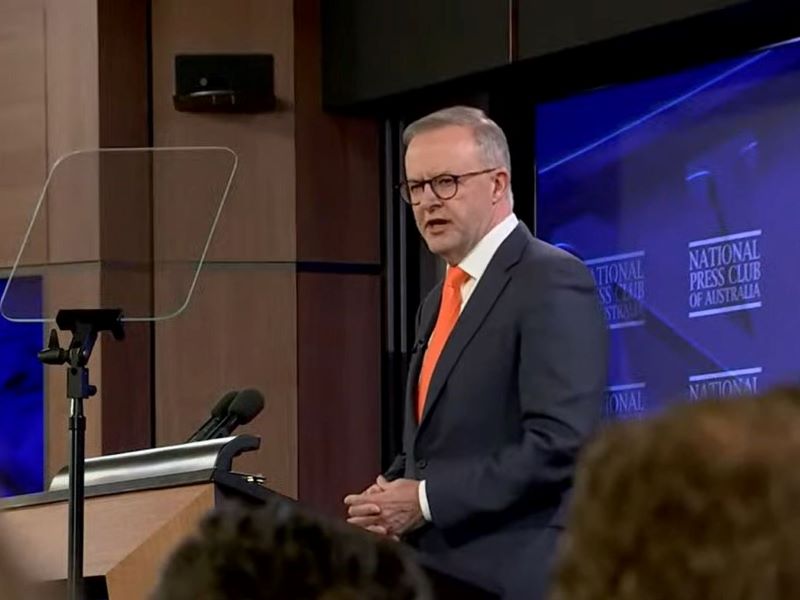More of the Australian critical and rare earth minerals underpinning the global energy transition should be processed onshore, the Prime Minister says, acknowledging a national opportunity of resource extraction for a “new generation of advanced manufacturing and value-adding” in Australia.
Following an address to the National Press Club in Canberra on Monday, where he promised urgency and ambition in reforms from a return to “good government”, Anthony Albanese said the energy transition, geopolitics and the changing costs of mining and processing have created a huge opportunity in resources.
He said Australia should move up the value chain by processing minerals like nickel, manganese and cobalt in Australia for both economic and strategic reasons.

He also backed new “structures” to make sure Australia does not fall into the gas trap where exports have taken precedent over local supply, and for a “different approach” to a traditionally dig-and-ship resource economy.
“The exporting of our resources will continue to be important, but where possible, we should value-add here,” Mr Albanese said.
“With the changing nature of the production process – with labour being less a proportion of input costs for production – we have that opportunity. And that’s why I speak about a future made in Australia.”
Mr Albanese wants the opportunity discussed at Thursday and Friday’s national Jobs and Skills Summit in Canberra, saying Australia has the human capital to get more from its abundance of resources.
“We have everything that goes into a battery. We have lithium, we have copper, we have all of those minerals that will increasingly be in demand. We should be value-adding here,” Mr Albanese said.
Critical minerals, and its subset of rare earth minerals, are an increasingly large part of the global economy and crucial to a renewable energy transition relying on wind turbines, electric vehicles, and batteries – all with components made from rare earth minerals.
Australia sits on a vast and untapped quantity of rare earth minerals, and is already the fourth largest producer of rare-earths in the world. There is a massive opportunity to become an even bigger global supplier, but also to do more of the processing and even manufacturing in Australia.
Australia could add $7.4 billion and 34,000 jobs to the economy by 2030 with a more diversified approach to battery value chains alone, according to Accenture research.
The previous federal government had acknowledged the opportunity as well, offering a $2 billion 10-year loan facility to critical mineral exporters and processors, and had began work on remapping and moving traditional global supply chains for critical minerals processing.
Labor has promised to go further with a $15 billion National Reconstruction Fund offering loans, guarantees and equity to businesses to do the work onshore. The fund includes $1 billion each for sub funds in resources and advanced manufacturing.
The Albanese government also campaigned on a “Future Made in Australia” policy which promotes domestic procurement by government and more training of apprentices, trainees and cadets, and has committed a $100 million Australian-made battery precinct and the first National Battery strategy.
On Monday at the press club address marking 100 days of Labor government, Mr Albanese also flagged the strategic importance of critical minerals and green technologies.
“At the moment, about 85 per cent of the world’s solar panels are made in one country. I think you can guess which one it is,” he said.
“That will rise to in excess of 95 per cent in a decade’s time. If the world is totally dependent, at a time when solar energy is more and more important on just one country, then that changes the whole power imbalance or what happens if that access is switched off.
“So we need to actually learn these lessons of the pandemic to be more resilient, to take more advantage, to stand on our own two feet. And it’s one of the reasons why I am so optimistic about Australia’s future – is that we have these natural advantages and let’s not waste the opportunity. Let’s not look back and say oh we wish we had of acted.”
Do you know more? Contact James Riley via Email.

